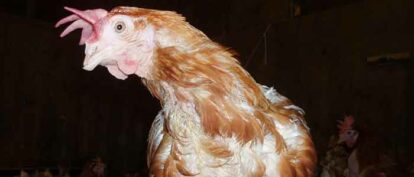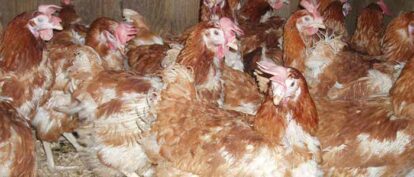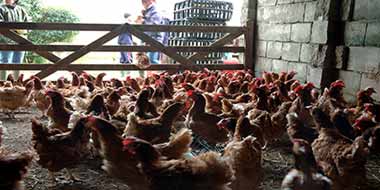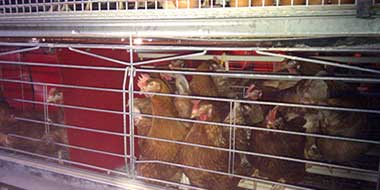Considering what they have been through, ex-battery hens don’t usually have too many health problems.
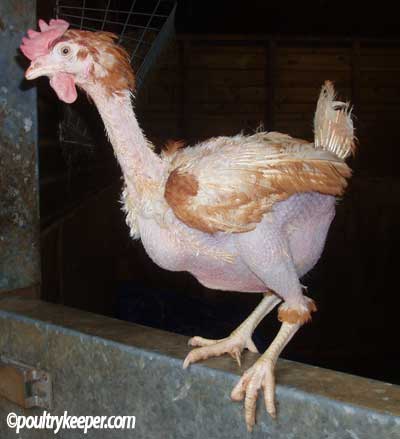 Battery hens are vaccinated against most of the serious poultry diseases that they could get and they don’t carry many worms since they cannot pick up the worm eggs in dirty litter having lived on a wire floor.
Battery hens are vaccinated against most of the serious poultry diseases that they could get and they don’t carry many worms since they cannot pick up the worm eggs in dirty litter having lived on a wire floor.
You will probably have an image of barely feathered ‘oven ready’ birds as we see in the media, but in fact many Ex-Bats do still have feathers. Feathers do regrow within 2 to 3 months though – so don’t let a bald bird put you off re-homing.
Some say the bald hens are the better layers because they are putting all of their energy into egg production. This makes sense when you consider that hens normally stop laying when they moult (lose feathers) and regrow them again. Feathers are 80% protein after all and guess what most of your egg is made up of? Yep… protein!
When you first get your ex battery hens, there are a number of minor health problems that you may have to deal with. As your hens recover, there can be a small number of ongoing problems. There may be some losses in your flock but if you read through this article, hopefully, you will be well equipped to spot some of the common health problems sooner rather than later.
1Stress Chickens are creatures of habit and are nervous to change. Stress is a problem for chickens and can cause them to stop laying or in more serious cases, pick up diseases. Battery cages are said to increase stress and aggression levels in the birds. Removing them from this environment, the only environment that they know can be very stressful for them, even though to us, it seems that what we are doing for them is good. Remember the birds you take home will probably not have been in the same cage together so they will need to get used to one another and establish themselves as a flock again. Do not force your birds out of their house or run. It is best to let them find their feet gradually, starting off with the inside of the hen-house. Apple Cider Vinegar (the unrefined version as used for horses) diluted down in their water is very good for chickens and reduces stress.
2Osteoporosis Keeping battery hens in cramped and barren conditions isn’t without a serious cost to their health. Highly productive hens have a high demand for calcium in order to produce strong egg shells and combined with a lack of exercise, this can lead to a painful condition known as cage layer’s osteoporosis which increases the chance of breaking bones.
Care must be taken when handling Ex-Bats. They should not be given high perches until they have had some months to recover and start to exercise / increase calcium levels. Most ex-battery hens are very easy to catch and will not run off but if they are out of reach, it is important not to catch them by holding a leg because it is surprisingly easy to dislocate or break a leg.
3Overgrown Beak A chicken’s beak will grow, just like the nails on our own hands. Chickens that can free range will usually wear their beak down as it grows naturally but battery hens don’t have an opportunity to do this. Charities that rehome battery hens will usually trim their beaks before you get them but if they don’t have time to do this for you then you will need to do this yourself. You will need a pair of dog nail clippers to do this. Trim a little off at a time, taking care not to cut through the ‘quick’ a blood vessel that runs down the beak.
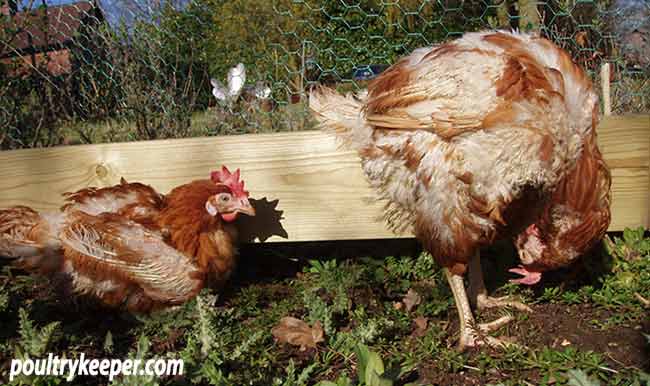
4No Eggs / Stopped Laying Hens living free range in the UK without additional lighting over the dark winter months will moult and stop laying over the shortest days of winter, starting again when daylight hours increase in the spring. This is perfectly natural and wild birds only lay in the spring. Battery hens have been bred specifically for producing large numbers of eggs so they will usually come into lay before pure breeds of poultry under natural conditions, however, like all chickens they will not normally lay during a moult. Chickens moult to replace their feathers usually once per year but battery hens have been kept under constant ‘mid summer’ lighting conditions to keep them laying. Once removed from their cages, they will take a little while to moult and regrow their feathers, they may stop laying whilst they replace their feathers.
5Strange Egg Shells Sometimes eggs can be soft, thin shelled or wrinkled. Eggs that are laid without a shell, are held just inside the membrane which is soft. This usually happens when hens are at the start or end of a laying cycle. Just about every strange egg condition is described in the Egg Problems section.
6Overgrown Nails: A chicken’s nails will grow, just like other animals and the nails on our own hands. Free range chickens don’t usually need their nails cutting because they are continually wearing their nails down in their environment but battery hens cannot do this living in a cage. Nails can be trimmed with a pair of dog nail clippers. Trim a little off at a time, taking care not to cut through the blood vessel that runs inside the nail. If you cut the blood vessel, it is hard to stop the bleeding. A styptic pencil can be used to stop this. Styptics are a specific type of antihemorrhagic agent that work by contracting tissue to seal injured blood vessels.
Don’t forget we have a ‘Poultry Diseases‘ section that covers these problems and a lot more to help you.


